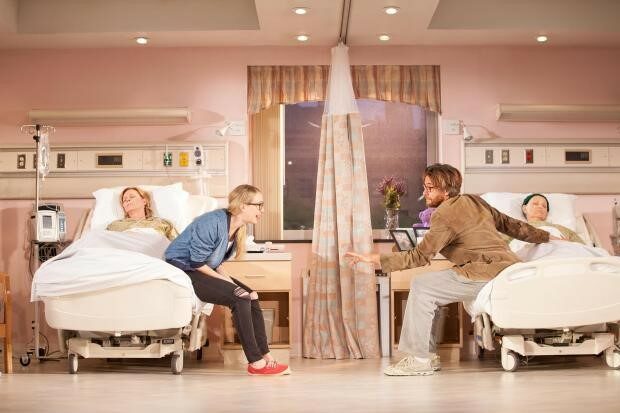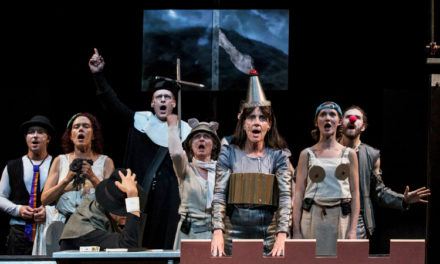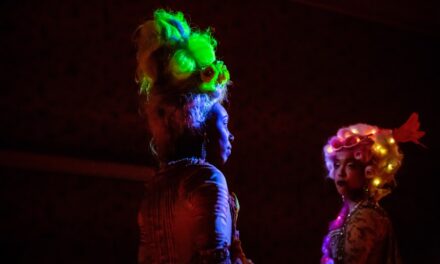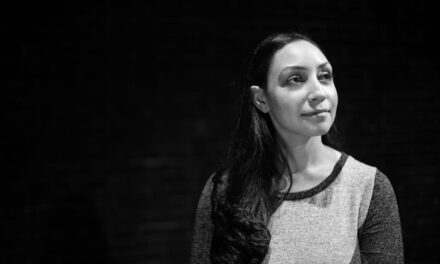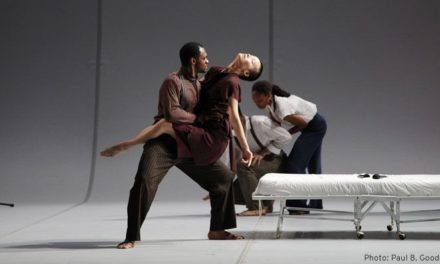Halley Feiffer spent her college years and young adulthood drowning in alcohol, almost to the point of death. After taking some time to return to writing and seeking out therapy, she’s now ten years sober and has had a play off-Broadway every year since she’s started writing plays. She has a fearlessness and grittiness that most American playwrights shy away from, embracing the fact that her plays might not be liked. Her plays I’m Gonna Pray For You So Hard looks at the difficult relationship between an aspiring actress and her playwright father while How To Make Friends And Then Kill Them analyzes the harmful attachment two sisters have. Feiffer writes honestly about female antiheroes and toxic family dynamics that shed a light on the darker aspects of human life that make audiences squirm. But she does it all with a smile—a survivor of addiction and a success in a male-dominated industry, Halley Feiffer cracks jokes as she balances her new play The Pain Of My Belligerence, focusing on the role relationships play in a politically-charged world, opening this spring, in addition to writing a pilot for television and working on a script for a musical.
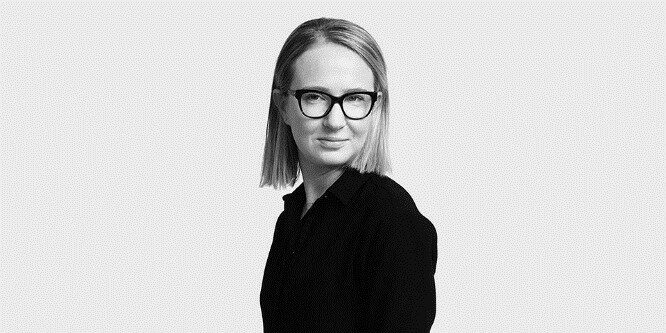
photo by Zack DeZon
The world premiere of your new play The Pain Of My Belligerence opens March 29…
Oh, it does? I better get on it! (jokingly) Fuck!
So I was wondering what’s kind of going through your head in these final weeks?
Oh, it doesn’t open that day [March 29], it previews that day so it’s quite different. It opens April 22nd or something like that. We actually haven’t started rehearsals. We start rehearsals March 1st so what’s going through my head is “I have to go on vacation this weekend so that I don’t kill myself while doing the play.” And I have to try to wrap up the other projects I have on my plate before I go into rehearsal because I think it’s important to, you know, share that it’s essentially impossible to make a living in playwrighting. There’s like five playwrights who do that, and I don’t know who they are but I think they’re all like seventy and older. So, the way to make a living is through writing television, and I just started writing what will hopefully be a Broadway musical and Trip Cullman will be directing that. I’m trying to turn in outlines for both those projects before we start and rewrite the play a little and study it a little bit, but it’s a lot. It’s a lot. I just share all of that because I think it’s so important that people know what this life looks like because people say to me, “Wow, you’re so busy!” and I’m like, “Yeah because I have to eat food and pay my rent!” Being a playwright is not the most beautiful life I can imagine and it’s not a way to get rich.
You act also and although your upcoming play isn’t autobiographical, you’re playing the lead role, which you’ve also done in a previous show. What leads you as a playwright to make that choice?
Ooh I love that question. It’s a relatively new thing for me. I always loved acting in addition to writing. I did much more acting when I was younger because writing is much scarier and more vulnerable, perhaps seemingly paradoxically. It just takes so much more self-generation which I wasn’t good at because I was drunk all the time and crying. (laughs) So after I got sober ten years ago, I really threw myself into writing and now I do both; I do a lot more writing than acting just because it’s really the love of my life, but I do acting if I love the part and either if someone else has written it or I’ve written it. I’m doing more of my own work. As you said this play is not autobiographical, but almost everything I write is inspired by some event or feeling that I had. This play is inspired by a few different romantic relationships I had in my twenties and even into my early thirties, in which I found myself really just signing onto my own subjugation in ways that really horrified and shocked me in ways that I couldn’t understand. I saw this happening to many of my other female friends as well, so I was very interested in the phenomena that leads to me essentially voluntarily sublimating my desires and rights in order to please men, when I call myself a feminist. Since the play is not autobiographical but it is personal, it was important to me that I play the main role. The play is called The Pain Of My Belligerence, it’s not her belligerence or our belligerence, it’s mine and I can only speak for myself. I just felt like in order for it to be the most honest exploration of this slice of my story I had to do it myself. And I want to just keep challenging myself as an artist, so this feels like a big challenge.
How much does acting help you in terms of writing these plays, and does it ever hinder it, in a way?
It’s hard because I’ve only done this once in production before at the Geffen in LA, and a few times in workshops and readings where I’ve acted in something that I’ve written. I’m always humbled by how hard it is because I do a lot of tinkering and rewriting; I’m quite a perfectionist when it comes to creating a new play and so it’s very hard to do that while you’re also acting in it. You can’t really take notes as easily while you’re delivering a monologue and then especially once you get into the rehearsal process or once you get off-book or are in previews. I can’t be taking notes while I’m acting so I kind of have to choose one over the other, which is difficult. It forces me to be present as an actor and to really let go and that’s not easy for me, either. They’re all very good lessons for me, but the system that I sort of found was just trying to file away the notes in my head as I’m doing the scene, and as soon as I get off-stage, I just write everything down or I have an assistant who I just scream at. No, just kidding. I have an assistant who I’ll just share everything with and just do the best we can and trust that the rehearsal will get taken care of.
It feels like by now you’ve kind of found your groove, you’ve done a lot of writing projects, but you have a really unique perspective on finding humor in pain and delving into darker material. I was wondering when you’re in the process of writing your plays, particularly at the beginning of your career, did you find yourself holding back at all or frightened of writing certain things out of fear of how other people would perceive it?
Weirdly, I think that because I started writing because I got sober—I almost died of alcoholism—I kind of wasn’t afraid of much. I should not be alive. I see that I don’t have the same kind of fear that a lot of other people seem to have, which doesn’t mean that I don’t have fears; I have really dumb fears that other people don’t have like… intimate relationships! (laughs) I don’t have a lot of fears around exposing myself as a writer because I almost died and part of the recovery process from alcohol for me was opening myself up and being brutally honest, hoping that I can help other people who are struggling with the things I’ve struggled with. For that reason, I weirdly didn’t have fear around that. I grew up in a family with two writer parents, I saw them really walk through their fears and expose themselves. My dad especially, because he had a philosophy of letting go of what other people think and not doing work for them and really doing work that excites you for you. I think I inherited that ideology and that’s been quite helpful.
From all the interviews I’ve read, you’ve been really open about your struggle with alcohol and you even talked about therapy playing a crucial role in writing the plays. Do you feel that other artists writing about darker subjects should seek out a therapist, or does it just depend on the person and what they’ve been through?
I don’t know. I was going to say I don’t see a downside, but I’ve had some kooky therapists who have actually really harmed me, so I guess I do. I think in my experience it’s been quite helpful just because it helps me sort out my thoughts and my experience and distinguishing reality from fantasy, either positive or negative fantasy. It really helps me, to use a kind of pop psychology term, process the event and then eventually turn them into art. This play [The Pain Of My Belligerence] for instance, I’m inviting my therapist to it, and I haven’t ever invited her to anything before.
Really?
Yeah, she helped me through the two relationships it’s inspired by. I don’t know if I could have written it without her. Beyond that, I don’t even know if I’d be alive without her. I’m sort of joking, but those relationships were so confounding and devastating to me that I needed a lot of help and she really helped me to remember that my life was worth living even if these men didn’t want to date me (laughs).
I love your twitter bio, which is “Honest stories about women, preferably with lots crying/laughing.” I feel that there aren’t enough stories out there about messed up, broken women that have gone through a lot, and you have a bit of a perspective on that. Where do you see stories like this going in the future as society is more vocal about better female stories, both from the perspective as a writer but also from other artists?
I’m passionate about displaying women honestly, as you can tell from my twitter bio. I’m really passionate about telling stories either about women with an eye towards honesty, and for me, as you’re pointing out, that means women in all their complexity and messiness and beauty and depravity. All of it. For me, I like creating a complex female antihero like Tony Soprano or Walter White or Don Draper. We have so many examples of male antiheroes and only a few women, but even then, not really. The only one I can really think of is Nurse Jackie, where she was “unlikeable” at times but still she had to be a great mom and the caretaker. I want to see women on stage and on screen who don’t want to be moms, who are pretty selfish and also lovable. I just want to see all of it, and I do consider that my mission and my pleasure in this life.
I know from my personal experience reading How To Make Friends And Then Kill Them and I’m Gonna Pray For You So Hard, I was surprised by how much you explored the darker, more uncomfortable elements of family relationships and dynamics. I saw you said I’m Gonna Pray was an alternate reality of your relationship with your father, so I was wondering what led you to decide to explore that in multiple plays?
For I’m Gonna Pray For You So Hard, my dad called me after the reviews had come out and he said that the reviews are really good, but he just wished they’d mentioned me more in them. I hung up the phone and went to the subway, and I thought, “I think I should throw myself in front of the subway.” I was like suicidally depressed. I think the subtext of this one comment my dad had said was “I’m proud of you,” which I think he meant very innocuously, but what I heard was “You’re a failure.” That basically became the play: what happens when two different people have different languages and have two different ways of expressing love and continuing to misunderstand each other and don’t have the tools to communicate and are also fueled by shared addiction. Which is not the case with me and my dad. He and I never drank heavily together, but I drank heavily. I just wanted to explore ways in which my own codependency and addiction to alcohol, but also attention and affirmation and adoration, could kill me. I’ve always been obsessed with the concept of shame and the American worship of cash and prizes that ultimately, I think, will destroy all of us, #DonaldTrump (laughs). For How To Make Friends And Then Kill Them, it wasn’t really inspired by any familial relationships. That play was inspired by a profoundly codependent friendship I had with my best friend for a decade when I was a child. I wanted to explore the ways in which women who care about each other ultimately hurt each other when they don’t have the tools to love each other because they’re so broken by dysfunctional families or just by corrosive patriarchal ideology.
I feel from what I’ve seen, no matter what field it is, it’s heavily male-dominated. Is it somewhat different when it comes to theatre and film/TV because TV is a much more collaborative environment with a writer’s room whereas for theatre it’s just writing on your own?
It’s all eventually very collaborative, such as with TV you’re in a writer’s room so that’s collaborative from the get-go. Playwrighting you write it on your own, and then you take it to a workshop or rehearsal process so then it’s collaborative. It’s all male-dominated for sure. I don’t know if you know about the Kilroys?
Yeah, I just heard about that recently!
Yeah, they were created because the disparity between the number of women and male playwrights being so huge was shocking and sort of invincible. It’s all male-dominated, I’ve only worked for male showrunners. It became my goal to try to work with females and female producers as much as I can in TV, and I’m doing that right now as I develop a television show with Annapurna TV and all the producers on the project are women. But it’s really hard in a male-dominated field, and it’s been intense in writer’s rooms where I’ve shared like, “Hey, this isn’t really how women have sex!” or “I don’t know if a woman might react that way.” Sometimes those responses are cultivated and sometimes they’re dismissed, and sometimes I’m dismissed. Sometimes I’ve been flirted with inappropriately, and sometimes I’ve been insulted and sometimes I’ve been “teased” in ways where the subtext seems to be “shut up.” It’s all really tricky to navigate, and I use the anger to fuel the rest of my writing and just try to have compassion for the insecure men who are merely playing up their roles within the patriarchy and pray for them because they’re not well.
I read that you’re currently working on a pilot, which you mentioned. Since television is more of a side project, is the pilot more of a passion project or what exactly led you to that?
I’ve sold a few different pilots, this is the third pilot that I’ve sold. I have to be passionate about anything that I take on in that capacity because it’s like usually a year, if not longer, in terms of development and you just spend a lot of time on it. By the time you make the money, which is a good chunk of money, you feel that you really earned it. When I get a job like that, I think, “Wow, I’m getting paid a lot of money to write 60 pages!” But that’s not it, it’s a year and a half of my life. This one I am quite passionate about. I don’t know how much I can say about it until it’s announced, but I’m developing with Annapurna TV and it’s about a female-driven ensemble, darkly comedic thriller is what I would say. Yeah, I think it’ll be really, really fun. I’m terrified and very excited.
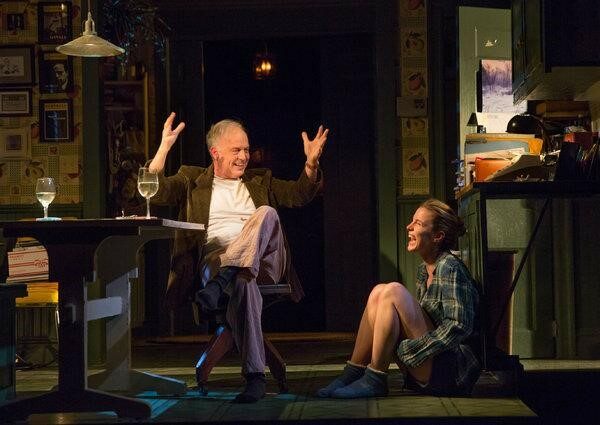
I’m Gonna Pray For You So Hard (Sara Krulwich)
I’ve been learning about theatre on the international side and you see just how little America devotes their money to theatre. So, I was curious if you had an unlimited budget, what would be your dream project?
I was talking to a German playwright and that’s what he was saying, he was like, “We have so much money! What are my limitations?” He can have however many characters he wants or none, I was like, “What!?” What would be my dream? I’m really obsessed with the idea of multiple plays happening in multiple spaces at once that are all related and all eventually come together in some extravagant and profound way. That’s my dream. I have this idea for like a trilogy of plays that I want to write all on a shared final theme. I think that would be my dream, having a cycle of three or five or six plays that are all happening simultaneously along a similar theme or sharing characters or actors. Really just an event that feels like a transportive feast. For site-specific, I would focus on what it would look like to put on a play not in a theatre. I find that very exciting.
Maybe one day, it just might have to be in Germany.
Yeah, I’ll take it!
With what you’ve talked about with future projects, I think your plays all have a common dark comedy link and feature women. What is the ultimate goal, and you’ve briefly mentioned this, that you hope to achieve when audiences sit down to watch or read your plays?
I don’t want to prescribe any experience to anyone. Weirdly, I don’t care if people don’t like it. I’m sorry if they don’t because I hate that people feel that they wasted their time. I’ve literally held the door open for people walking out of my plays during intermission. I’m like, “Thanks for coming!” I don’t care because I know my plays aren’t for everyone. What I hope to provoke is the transformative experience in the theatre where I’ve gone to a play and left and felt like I’ve been shifted internally in ways that are indelible, which is why I love theatre and art. I’m hoping to provoke that kind of experience in just a handful of people, if possible. My goals aren’t terribly lofty, I just—if I can help people see something a different way or have compassion for people who might be a little different from them or understand their own lives perhaps a little more clearly, then I feel like I’ve really done my job. With our movie that we made years ago, my character was a narcissistic belligerent alcoholic named “Halley Feiffer” (laughs). After our movie premiered at a film festival, somebody came up to me at the party and said, “I am 32 days sober and this inspired me to keep going,” because my character gets sober in the movie. Someone else said to me after seeing A Funny Thing [Happened On The Way To The Gynecologic Oncology Unit At Memorial Sloan-Kettering Cancer Center Of New York City], which is a play about fractured relationships between a mother and a daughter that ultimately gets somewhat healed by the end, and several people came up to me saying, “Oh my gosh, I have such an intensive relationship with my mom and I’m going to call her tomorrow.” That made me want to just burst into tears. I realized we really can change lives one tiny thought or event at a time.
This post was written by the author in their personal capacity.The opinions expressed in this article are the author’s own and do not reflect the view of The Theatre Times, their staff or collaborators.
This post was written by Delaney Powell.
The views expressed here belong to the author and do not necessarily reflect our views and opinions.

